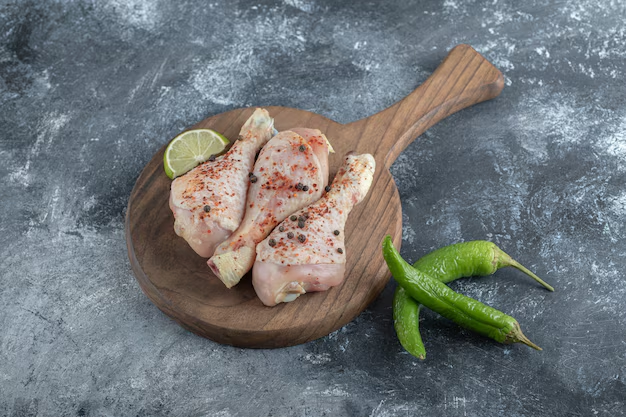The Ultimate Guide to Marinating Chicken: How Long is Too Long?
Picture this: You're preparing for a delicious dinner party and want to serve a succulent and flavorful chicken dish. Marinating your chicken seems like a foolproof way to infuse it with tons of flavor, but as you start to plan, a question pops into your mind—how long can you actually leave chicken marinating in the refrigerator without risking quality or safety? Let's explore this topic in detail, covering all aspects of chicken marination for those who love to cook and those who want to master the art of food storage.
Understanding the Basics of Marinating
Marination is a process of soaking food in a seasoned liquid before cooking. It's a cultural culinary technique that has been used across different cuisines to enhance the taste, texture, and aroma of various meats and poultry. But how does it work?
How Marinating Works
- Flavor Infusion: The acidic component of a marinade—often lemon juice, vinegar, or yogurt—helps to tenderize the meat and allows flavors to penetrate the chicken.
- Tenderization: Acids and enzymes break down proteins, making the meat more tender and juicy.
- Preservation: While marinating is not a substitute for refrigeration, the right combination of salt and acidity can help slow down bacterial growth.
How Long Can You Marinate Chicken in the Refrigerator?
Deciding how long to marinate chicken hinges on finding the balance between achieving great flavor and ensuring food safety. The general consensus is:
- 30 Minutes to 2 Hours: This is a safe and optimal marination period for chicken, yielding strong flavors without risking texture.
- Up to 24 Hours: While chicken can be marinated safely in the refrigerator for up to a day, more delicate tissue can start to break down beyond this time frame, potentially turning the texture mushy.
- Beyond 24 Hours: Extended marination can lead to overly tenderized and compromised texture. Additionally, the flavor can become overpowering.
Factors Influencing Marination Time
- Type of Marinade: More acidic marinades require shorter marination times to avoid excessive breakdown.
- Cut of Chicken: Larger cuts, like whole breasts or legs, can handle longer marination, whereas smaller cuts require less time.
- Flavor Intensity: Spice lovers may opt for longer marination for more intense flavors, but keep an eye on texture changes.
Important Tips for Safe Marination
- Always marinate chicken in the refrigerator, not at room temperature, to prevent bacterial growth.
- Store marinating chicken at temperatures below 40°F (4°C) to ensure safety.
- Discard any leftover marinade or boil it before using it as a sauce, as raw chicken juices can harbor bacteria.
Common Marinades and Their Timeframes
To help demystify marination, let's look at a few classic marinade types and suggested times for refrigeration.
Citrus-Based Marinades
- Ingredients: Lemon, lime, orange, mixed with olive oil and herbs
- Flavor Profile: Fresh, zesty, and aromatic
- Time: 30 min to 4 hrs for best results
Yogurt and Buttermilk Marinades
- Ingredients: Yogurt or buttermilk, garlic, ginger, and spices
- Flavor Profile: Creamy with a gentle tang
- Time: 2 to 8 hrs is recommended to achieve a tender and flavorful result
Vinegar-Based Marinades
- Ingredients: Apple cider or balsamic vinegar, with garlic, brown sugar, and soy sauce
- Flavor Profile: Rich, tangy, and slightly sweet
- Time: 1 to 12 hrs; vinegar is potent and can act quickly
Tips for Perfectly Marinated Chicken
Marinating chicken might seem straightforward, but attention to detail can enhance the entire cooking experience. Here are some practical tips:
📝 Practical Tips
- Keep It Covered: Use a resealable bag or baking dish with a lid to ensure the marinade fully covers the chicken.
- Even Coating: Turn the chicken halfway through the marinating time to ensure even flavor absorption.
- Storage Strategy: Label marinating containers with the starting time to keep track of marination duration.
- Avoid Metal: Marinate in glass or food-safe plastic; metal containers can react with acidic ingredients.
When Longer Isn't Better: Risks of Over-Marinating
While marinating has its plethora of benefits, there's a threshold beyond which the process can be detrimental. Over-marinating, especially with acidic solutions, can lead to the breakdown of chicken proteins to a degree that produces undesirable effects.
Risks of Over-Marinating
- Texture Changes: Chicken may turn mushy, losing the desirable chewiness.
- Flavor Overkill: Intense ingredients can dominate, masking the natural flavor of the chicken.
- Food Safety Concerns: Extended storage of marinated chicken—as it ages—can increase food safety risks.
Key Takeaways and Practical Tips
For quick reference, here is a visually distinct summary of ideal marination tips:
| Timeframe | Effect | Best For |
|---|---|---|
| 30 min - 2 hrs | Light flavor | Quick meals or small pieces like tenders |
| 2 - 8 hrs | Balanced flavor and tenderness | Most recipes and common marinade types |
| 8 - 24 hrs | Deep flavor; risk of over-tender | Rich, aromatic marinades with large cuts |
Here are some additional tips to keep in mind:
- ⏱️ Short on Time? Opt for a robust marinade like vinegar-based ones for quick results inside 1-2 hours.
- 🚫 Avoid Long Marinades with pure citrus juices—they’re strong and can tenderize quickly.
- 🙅♂️ Do Not Reuse Marinade that has been in contact with raw chicken without cooking it thoroughly.
Bringing It All Together
Marinating chicken is an art in itself. With the right balance of time and ingredients, you can elevate your chicken dishes significantly. Remember, while marination is a powerful flavor tool, it's essential to adhere to guidelines that maximize both taste and safety. Enjoy experimenting with different marinade recipes and find that sweet spot where taste meets texture perfectly. Whether you're preparing a quick weekday dinner or an elaborate weekend feast, these insights will help you serve up something truly delicious every time.

